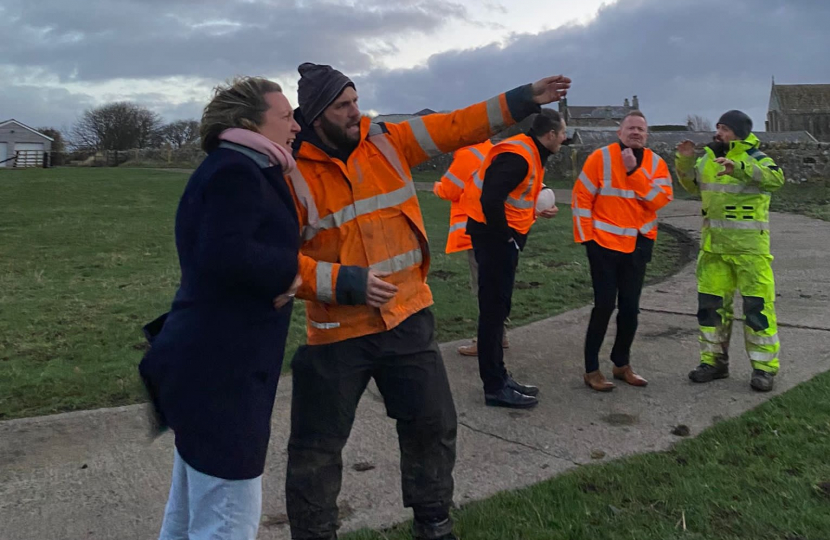
Rt Hon Anne-Marie Trevelyan, MP for Berwick-upon-Tweed, has given her reaction to the reports from BEIS and Ofgem - both realised today - which look into the issues surrounding resilience, repairs, communications and compensation experienced in the wake of Storm Arwen by the Distribution Network Operators (DNOs).
The MP - who was off power herself for 8 days after the storm - contributed to both reviews, with contributions informed by both correspondence she received from affected constituents on their experiences and frustrations in reporting their power outages and receiving accurate information on repairs, and from the surveys she ran on how the compensation schemes performed. All these issues have resulted in BEIS and Ofgem requiring remedial action by the DNOs to ensure the issues encountered will not be repeated in future severe storms. As a result of the reviews, the network operators have agreed that they will pay a further £10.3million in voluntary redress payments to the affected communities through contributions to community funds and in donations to vulnerability support charities.
Speaking after receiving advanced copies of the reports, the MP said:
"It is fantastic to have the difficulties we experienced after Storm Arwen acknowledged by both BEIS and Ofgem as both serious and requiring remedy. I think the recommendations in the report are fair and necessary, and the targets set are reasonable and crucially should come before autumn comes once more [by September 2022 for most recommendations]. I am really pleased we have been listened to, and I thank BEIS and Ofgem for their work, but most of all I thank the hundreds of local residents who took the time to share their experiences with me and complete my surveys so I was able to present a weight of evidence to inform these reviews.
"I am also pleased BEIS is recommending Ofgem reconsider the £700 cap on compensation, which was voluntarily lifted on this occasion by the DNOs, as it would not have been adequate recompense for a lot of affected customers. I look forward to meeting with Northern Powergrid and Scottish Power in due course to find out how they are going about implementing these recommendations, and how they will ensure we achieve greater resilience in our network to prevent outages, and systems more capable of good communication and service to customers in the event that outages take place."
The Ofgem and BEIS reports’ primary conclusions are:
System Resilience:
- The review found that existing network standards did not provide adequate resilience to Storm Arwen’s unusual northerly winds.
- A new ‘outcomes-focused physical resilience standard’ will be developed, which will define resilience standards in terms of the outcomes for consumers, as opposed to the current standards, which are solely defined as measures to be implemented.
- Each Distribution Network Operator (DNO) has been ordered to review their severe weather escalation plans, to ensure all relevant factors that can influence the scale of impacts, such as wind direction, are considered.
- The government will update industry best practice to ensure network operators can quickly identify faults and safely assess the extent of network damage earlier in a storm, exploring how smart meter data and technology can help with this.
Customer Communication:
- One of the biggest issues faced by those impacted was the poor service customers received when trying to contact their network operator. The review found all impacted DNOs had excessive abandoned calls and maximum wait times.
- DNOs have been ordered to ensure that communication systems are adequate to meet demand, and introduce telephone systems and websites capable of handling increased traffic during a storm. This includes considering any additional resourcing or processes to avoid call centres being overwhelmed, such as hiring more staff and sharing call handlers between organisations where necessary.
Compensation:
- There will be changes to the compensation payment system so customers are more aware of what they are entitled to, and so compensation is paid out faster.
- Although nearly 90% of those affected received compensation payments by 24 January 2022, following the Business Secretary calling for customers to promptly receive payments, the review recommends DNOs should develop more robust payment mechanisms.
- This will ensure they can deliver payments at scale and continue their development customer accounts that allow customers to directly update their contact details to their DNOs, so compensation can be paid more swiftly.
- The Energy Networks Association will lead on developing more publicity for compensation entitlement in the event of a power cut.
- The energy regulator Ofgem will commission a review into the compensation payment structure, looking at whether a compensation cap [£700, which was lifted voluntarily on this occasion] is still appropriate, developing alternative options to the system, and improving the accuracy of customer data.
You can read both reports below.

